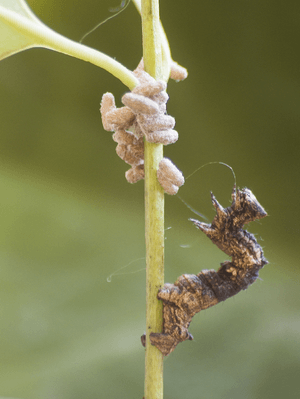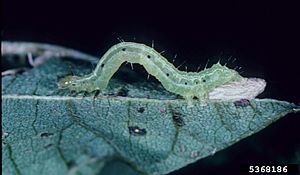Glyptapanteles facts for kids
Quick facts for kids Glyptapanteles |
|
|---|---|
 |
|
| A caterpillar of the geometrid moth Thyrinteina leucocerae with pupae of the braconid parasitoid wasp Glyptapanteles sp. | |
| Scientific classification |
|
| Kingdom: | Animalia |
| Phylum: | Arthropoda |
| Class: | Insecta |
| Order: | Hymenoptera |
| Family: | Braconidae |
| Subfamily: | Microgastrinae |
| Genus: | Glyptapanteles Ashmead, 1904 |
| Diversity | |
| at least 300 species | |
Glyptapanteles is a fascinating type of wasp. These tiny wasps are found in Central and North America. They are known as endoparasitoids, which means their young live inside another animal. What's really amazing is how the baby Glyptapanteles wasps make their host, usually a caterpillar, act like a bodyguard!
Contents
Life Cycle of Glyptapanteles Wasps
A female Glyptapanteles wasp starts its family by laying eggs. She uses a special tube called an ovipositor to place her eggs inside a caterpillar. The eggs then hatch inside the caterpillar's body.
The caterpillar continues to eat and grow normally for a while. It usually reaches its 4th or 5th instar (a stage between molts). Then, something incredible happens. Up to 80 fully grown wasp larvae burst out of the caterpillar's body! After they emerge, these larvae quickly form pupae. A pupa is like a cocoon where the larvae change into adult wasps.
How Wasps Control Caterpillars
After the young Glyptapanteles wasps leave the caterpillar, the caterpillar doesn't just die right away. Instead, it moves close to the wasp pupae. It arches its back and stops moving or eating. Sometimes, it even spins silk over the pupae to protect them.
If something tries to bother the wasp pupae, the caterpillar starts to thrash around wildly. It hits and scares away possible predators, like other insects or birds. This strange behavior helps the wasp pupae survive. Studies show that caterpillars controlled by the wasps are much better at protecting the pupae.
Caterpillars that were not controlled by the wasps rarely acted this way. In fact, 60% of the time, the controlled caterpillars successfully chased away predators. Because the caterpillar stops eating, it eventually dies. If the wasp pupae didn't have a caterpillar bodyguard, many more of them would die.
The Secret Behind the Control
Scientists have studied how these wasps control the caterpillars. They found that not all the Glyptapanteles larvae leave the caterpillar. One or two larvae stay inside. These remaining larvae are thought to be the ones that control the caterpillar's behavior.
This is a type of altruism. The larvae that stay behind give up their own chance to become adult wasps. They sacrifice themselves to protect their brothers and sisters. It's a truly amazing example of how parasites can change their hosts!
See also
 In Spanish: Glyptapanteles para niños
In Spanish: Glyptapanteles para niños
 | Sharif Bey |
 | Hale Woodruff |
 | Richmond Barthé |
 | Purvis Young |


